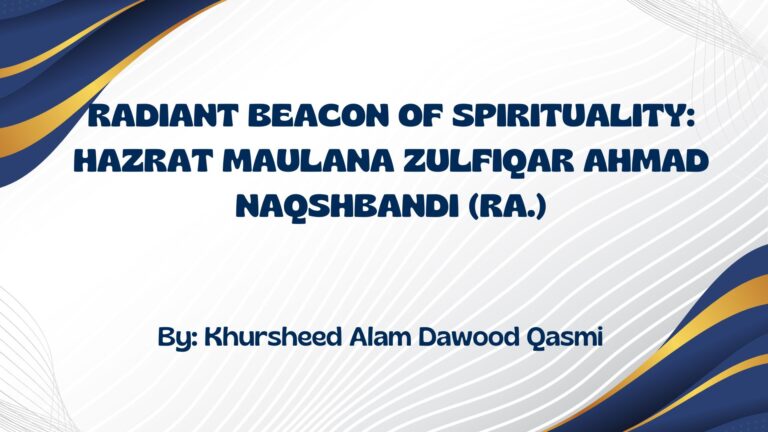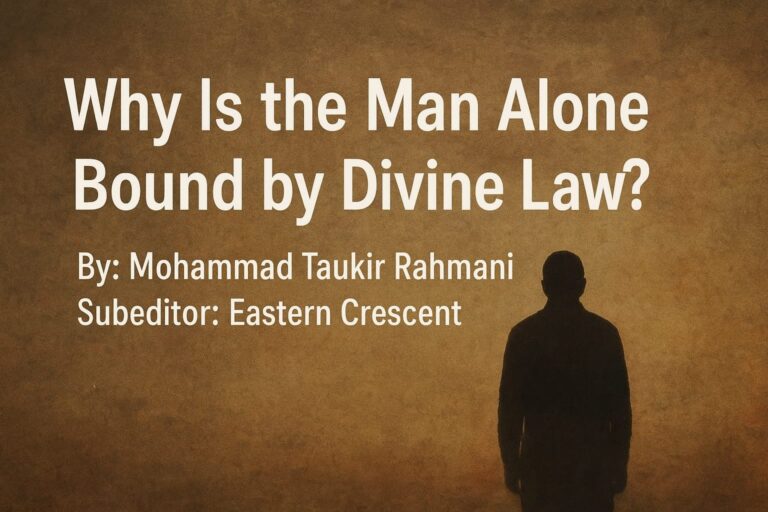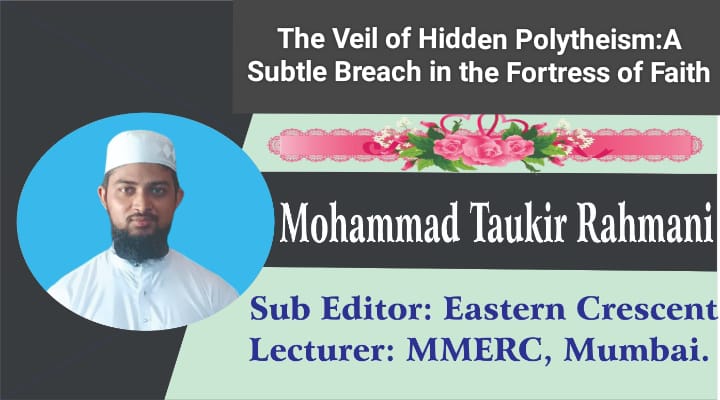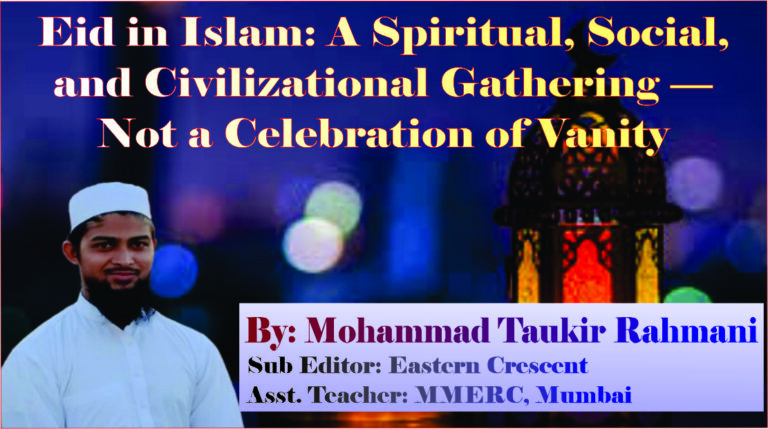
Shirk: Not Just a Theological Flaw, But a Darkness of Consciousness
Shirk: Not Just a Theological Flaw, But a Darkness of Consciousness
By: Mohammad Taukir Rahmani
Sub-editor: Eastern Crescent
Shirk—a word that appears simple on the surface, yet conceals layers of complex and profound meaning. It is not merely an error of belief, but a fundamental darkness of consciousness. It is the spiritual poison that, when it enters the heart, corrupts the purity of tawheed (oneness of God) and drags the human soul from the summit of servitude to the abyss of creature-worship. Many mistakenly equate shirk with crude idol worship, unaware that its subtler forms are often hidden in the sophisticated corridors of intellect and reason.
To truly recognize shirk in its many guises, one must first understand the divine attributes of Allah—their nature, their magnitude, and their exclusivity. These attributes are not just linguistic expressions or symbolic gestures; they are essential manifestations of the Divine Essence—eternal, absolute, peerless, and self-sufficient.
From a theological perspective, divine attributes can be broadly classified into three distinct categories:
1. Exclusive Attributes of Divinity (Sifāt Khāssa)
These are the attributes reserved solely for Allah. No creature—no matter how powerful—can claim a share in them. Attributes such as Creator, Sustainer, the Self-Sufficient, the Eternal, the Absolute—these belong only to the Almighty. Associating anyone or anything with these attributes, even at the level of thought or imagination, constitutes shirk jali (manifest polytheism), which severs the soul from the core of Islamic belief and thrusts it into the abyss of spiritual rebellion.
2. Prohibited Attributes for Creation
These are attributes that do exist in Allah but are forbidden for His creation to adopt or assume. For instance: absolute power, coercion, pride, self-glorification, or complete independence. Though humans may display traces of these traits, claiming them as inherent or acting upon them with arrogance veils the heart from humility and gradually aligns the ego with divinity. This is shirk khafi—a hidden polytheism that does not announce itself through idols, but erodes the spirit of tawheed from within.

Yet, there is a paradox here: while adopting these traits is prohibited, recognizing them in Allah and responding with humility is a sign of spiritual awareness. For instance, Allah is Al-Qahhar (The Subduer), so the servant must see himself as subdued. Allah is Al-Mutakabbir (The Supreme), so the believer embraces humility in response.
3. Admirable Attributes for Humans
These are divine traits that, while belonging to Allah, are encouraged in humans in limited and ethical forms—mercy, justice, patience, forgiveness. Not only are these traits praiseworthy, but they are the very means through which man reflects the divine light within the human realm. “Be merciful among yourselves,” “Forgive those who wrong you”—such teachings nurture the soul in the shadow of Divine Mercy.
However, here lies a subtle but critical distinction: God’s attributes are essential, perfect, and eternal; human attributes are acquired, imperfect, and contingent. The moment this line is blurred, the door to intellectual deviation opens—and the fog of shirk begins to descend upon the heart.
In our age of scientific discovery and intellectual achievement, this deviation is becoming increasingly common. As human knowledge expands and technology unearths the hidden mechanisms of the universe, many begin to glorify creation at the expense of the Creator. The temptation to attribute autonomous creative power to humans is a subtle but dangerous form of shirk. It is not idol-worship—but idea-worship. It replaces the shrine with the laboratory, and the idol with the intellect.
Can a Scientist Be Called a Creator?
When a scientist invents something, does that make him a creator in the divine sense?
Absolutely not. Nothing in the universe comes into being ex nihilo (from absolute nothingness) except by Divine Command—“Be!” (Kun), and it is. Only Allah possesses that power. Humans merely uncover what already exists. They reorganize, rearrange, repurpose—but they do not originate in the true sense. Every invention is merely a discovery of the hidden potential embedded by Allah in His creation.
Edison did not create the light; he harnessed it. Tesla did not invent energy; he channeled it. These individuals deserve credit for their brilliance, no doubt, but to call them creators in the metaphysical sense is to obscure the line between invention and creation—and therein lies the root of modern shirk.
This is where the new idolatry emerges—not in temples, but in think-tanks; not in rituals, but in reasonings; not through statues, but through scientific pride. It cloaks itself in intellectual garments and preaches from the pulpits of progress. But its message, stripped of rhetoric, is the same ancient rebellion: forgetting the Creator in the admiration of creation.
Is Knowledge Then a Fitnah?
No. Knowledge is light. But when that light is severed from its divine source, it becomes a fire—one that burns reason, then faith. The greatest intellectual danger today is not ignorance, but arrogant knowledge—the kind that enthrones man where only God belongs.

This new shirk does not require chants or sacrifices. It works quietly, replacing divine remembrance with human self-reliance, and slowly hollows the foundations of faith. It may not sculpt a physical idol, but it carves in the mind a god-like image of man himself.
Tawheed Is Not Just a Creed—It Is a Consciousness
Saying “Allah is One” is only the beginning. Tawheed is a worldview. It is the lens through which we see every phenomenon as a reflection of Divine Will and Creative Power. It is the awareness that behind every breakthrough, every marvel, every display of genius, lies the silent Hand of the Creator.
Tawheed is not a slogan. It is not a dogma filed under “theology.” It is the very architecture of reality, the heartbeat of creation, and the grammar of truth. To affirm “La ilaha illAllah” is to say:
Every perfection I see—belongs to Allah.
Every wisdom I uncover—echoes His Will.
Every innovation I admire—rests on His permission.
When we witness innovation, a scientific marvel, our hearts should whisper:
“Blessed is Allah, the best of creators!”
(فَتَبَارَكَ اللَّهُ أَحْسَنُ الْخَالِقِينَ)
That is the essence of faith. That is the soul of knowledge. And that is the light of tawheed.
We must reclaim tawheed not merely as a statement of worship, but as a framework of thought—purifying our understanding of science, philosophy, art, and civilization itself. Every discovery should elevate our awe of the Creator, not our pride in the creation.
For in the end, all roads of knowledge must lead to one destination:
La ilaha illAllah. There is no god but Allah.
You May Also Like
 Articles
ArticlesRadiant Beacon of Spirituality: Hazrat Maulana Zulfiqar Ahmad Naqshbandi (Rah.)
By: Khursheed Alam Dawood Qasmi First Acquaintance with Peer Sahib: It was around the...
 Islam
IslamWhy Is the Man Alone Bound by Divine Law?
Why Is the Man Alone Bound by Divine Law? By: Mohammad Taukir Rahmani EC...
 Culture
CultureThe Flood of Heresy: A Manifestation of Ideological Colonialism and a Trial for Islamic Consciousness
The Flood of Heresy: A Manifestation of Ideological Colonialism and a Trial for Islamic...
 Islam
IslamThe Veil of Hidden Polytheism: A Subtle Breach in the Fortress of Faith
The Veil of Hidden Polytheism: A Subtle Breach in the Fortress of Faith By:...
 Islam
IslamHuman Creation: Existence for the Sacred Trust of Earthly Vicegerency
Human Creation: Existence for the Sacred Trust of Earthly Vicegerency By: Mohammad Taukir Rahmani...
 Islam
IslamEid in Islam: A Spiritual, Social, and Civilizational Gathering — Not a Celebration of Vanity
By: Mohammad Taukir Rahmani EC Exclusive Islam is not merely a religion confined to...

Comments (11)
Leave a Comment
Hello! I could have sworn I’ve been to this blog before but after browsing through some of the post I realized it’s new to me. Anyways, I’m definitely happy I found it and I’ll be book-marking and checking back frequently!
There is noticeably a bundle to know about this. I assume you made certain nice points in features also.
I haven’t checked in here for a while because I thought it was getting boring, but the last several posts are good quality so I guess I will add you back to my daily bloglist. You deserve it my friend :)
I conceive you have observed some very interesting details, regards for the post.
Fantastic blog! Do you have any tips and hints for aspiring writers? I'm hoping to start my own blog soon but I'm a little lost on everything. Would you suggest starting with a free platform like Wordpress or go for a paid option? There are so many choices out there that I'm completely overwhelmed .. Any tips? Thanks!
Hello, i feel that i noticed you visited my web site thus i got here to “return the favor”.I am trying to find issues to improve my website!I suppose its good enough to make use of a few of your ideas!!
Undeniably believe that which you said. Your favorite justification seemed to be on the internet the simplest thing to be aware of. I say to you, I certainly get irked while people consider worries that they just do not know about. You managed to hit the nail upon the top as well as defined out the whole thing without having side-effects , people can take a signal. Will probably be back to get more. Thanks
I must get across my passion for your kind-heartedness for individuals that require help with in this situation. Your real commitment to getting the solution all around has been exceedingly helpful and has made associates just like me to get to their endeavors. Your new helpful instruction entails a great deal to me and additionally to my office workers. Best wishes; from each one of us.
It?¦s really a cool and helpful piece of information. I am glad that you just shared this useful info with us. Please keep us up to date like this. Thank you for sharing.
Some really good info , Gladiola I discovered this.
I do trust all of the ideas you have introduced for your post. They are really convincing and can certainly work. Still, the posts are too brief for novices. May you please extend them a bit from subsequent time? Thank you for the post.